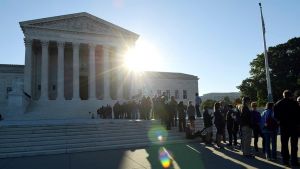By: Madeline Farber – foxnews.com – June 26, 2018
Abortion case could have wide-ranging implications
In a 5-4 vote on June 26, the Supreme Court ruled in favor of pro-life crisis pregnancy centers, arguing that a California law passed in 2015, which requires the centers to inform clients about free or low-cost abortion services, is probably a violation of free speech.
The news comes after the Supreme Court agreed to hear the case in November 2017. Oral arguments officially began in March.
NIFLA
@NIFLA
BREAKING: U.S. Supreme Court Rules in Favor of #ProLife Pregnancy Centers and Free Speech in #NIFLAvBecerra
Read more here: https://nifla.org/u-s-supreme-court-rules-in-favor-of-pro-life-pregnancy-centers/ …
9:36 AM – Jun 26, 2018
In light of the decision, which casts doubt on similar laws in Hawaii and Illinois, here’s what you need to know about National Institute of Family and Life Advocates v. Becerra.
What does the California law say?
California’s Freedom, Accountability, Comprehensive Care and Transparency Act, more commonly known as the FACT Act, was passed in October 2015. It requires pregnancy facilities to post a disclosure to inform clients that “California has public programs that provide immediate free or low-cost access to comprehensive family planning services, prenatal care and abortion for eligible women,” according to the law. It also requires unlicensed, non-medical facilities to inform clients that they are not licensed medical providers.
The public notice is required to be posted in a “conspicuous place” in the facility’s waiting room, and must be “8.5 inches by 11 inches and written in no less than 22-point type.” However, clinics can also choose to provide printed or digital notices to clients instead.
If pregnancy centers fail to comply with the law, they’re fined $500 for a first offense and $1,000 for each subsequent offense, according to the law.
What’s the rationale behind the law?
More than 700,000 California women become pregnant each year, and half of those pregnancies are unintended. Yet “thousands of women remain unaware of the public programs available to provide them with contraception, health education and counseling, family planning, prenatal care, abortion or delivery,” California legislators argue.
“Because pregnancy decisions are time sensitive, and care early in pregnancy is important, California must supplement its own efforts to advise women of its reproductive health programs,” the law reads.
Low-income women can receive access to free or low-cost family planning services through California’s Medi-Cali and Family PACT programs. But only Medi-Cal providers who are enrolled in the Family PACT program can enroll patients at their health centers. That’s why legislators argue that the most effective way to ensure women in the state “quickly obtain the information and services they need to make and implement timely reproductive decisions,” according to the bill, is by requiring licensed health care facilities — regardless of their stance on abortion — to inform women of their options.
In addition, legislators argue it’s “vital” pregnant women in the state know when they are receiving medical care from a licensed professional. This is addressed by the requirement that unlicensed facilities that “advertise and provide pregnancy testing” must disclose to clients that they are not licensed medical care providers.
This portion of the law is also targeted at religious pregnancy resource centers because many of them are not licensed medical facilities, supporters of the legislation say — adding that these facilities provide misleading information about the services they offer to women to deter them from getting an abortion.
What’s happened since the law was passed?
The legislation triggered lawsuits almost immediately after it was passed. One religious non-profit, the Scharpen Foundation, won its case against the state of California and will no longer have to adhere to the FACT Act. But other pro-life pregnancy centers have been widely unsuccessful in getting the law overturned, especially at a federal level.
The National Institute of Family and Life Advocates (NIFLA) and the plaintiff in the Supreme Court case sought a preliminary injunction to prohibit enforcement of the Reproductive FACT Act. NIFLA claimed the law violated their First Amendment rights to free speech and free exercise of religion.
But the 9th Circuit Court of Appeals rejected both arguments and upheld the law — arguing that the state could regulate professional free speech and the law protects public health interests.
On Nov. 13, the Supreme Court granted “certiorari,” or a formal order, to only review NIFLA’s free speech argument.
What do opponents say?
NIFLA, which first filed a legal challenge to the FACT Act in 2016, is a public interest law firm that gives legal counsel and training to pregnancy centers across the country.
Roughly 135 pregnancy resource centers in California are members of NIFLA, Thomas Glessner, founder and president of the organization, told Fox News. With the Supreme Court case approved, this means that NIFLA will fight the law for each of its members collectively as opposed to each center individually fighting the law on its own.
“[The law] was a brilliant political move on their part,” Glessner said. “It mandates under law that the pro-life centers are advertising for abortion.”
To see the rest of the opposition and to see what the supporters say, click read more.
![]() Source: Supreme Court rules in favor of pro-life crisis pregnancy centers: A breakdown of NIFLA v. Becerra
Source: Supreme Court rules in favor of pro-life crisis pregnancy centers: A breakdown of NIFLA v. Becerra
 Listen Online
Listen Online Watch Online
Watch Online Find a Station in Your Area
Find a Station in Your Area









 Listen Now
Listen Now Watch Online
Watch Online
